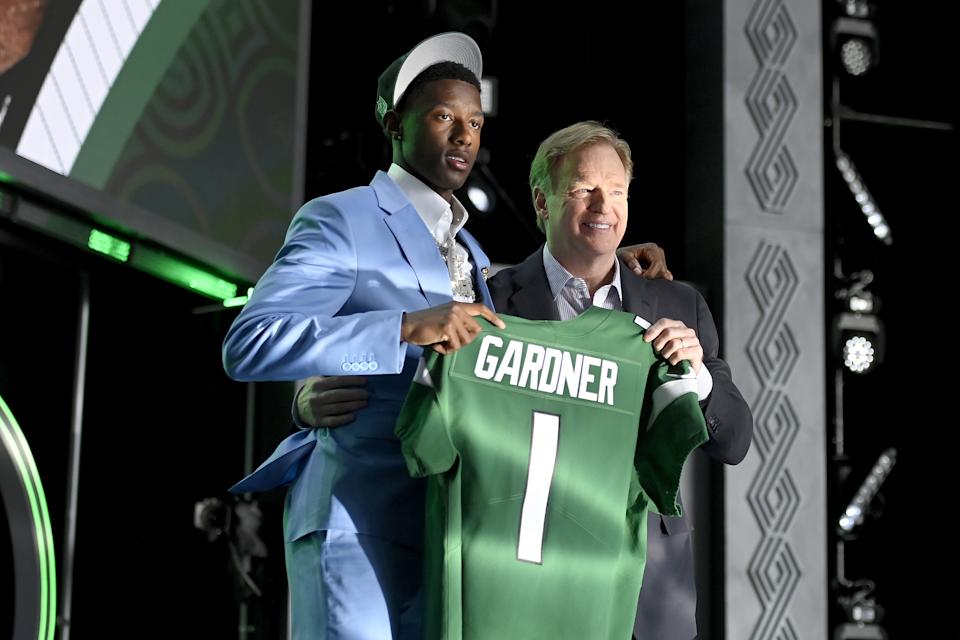The Georgia Bulldogs set a record this year by having 15 players selected in a single NFL draft. LSU was the next most for 2022 with 10 picks.
Then there was the team with nine.
Not Alabama. Not Clemson. Not Ohio State.
Not anyone from the SEC or Big Ten or any “Power 5” conference.
It was Cincinnati. Luke Fickell’s Cincinnati Bearcats.
Nine draft picks in a single class is an astounding accomplishment for any program. Since 2016, only Alabama, Georgia, Ohio State, Michigan and LSU have boasted classes with more. Yet to do it at an American Athletic Conference school with a 40,000-seat stadium is next level stuff.
Put it this way, 13 of Georgia’s 15 draft picks arrived in Athens as either four- or five-star recruits per Rivals.com. None of Cincinnati’s were as highly regarded coming out of high school — each was a three-star or below per Rivals. Only Jerome Ford, who transferred from Alabama and was picked in the fifth round by Cleveland, could be considered a coveted recruit. But he left Tuscaloosa seeking playing time.
The Bearcats’ draft bonanza left NFL front offices buzzing about Fickell’s ability to scout high school talent, develop it at the college level and build a culture of competition.
The success stories included Ahmad “Sauce” Gardner, who Fickell said weighed 158 pounds as a gangly cornerback at Detroit King High School, winding up going fourth overall to the New York Jets. And Bryan Cook, a zero-star recruit who transferred in from Howard only to become a second-round pick at safety for Kansas City.
And, well, any and all of them.
“Obviously your first thought is you’re excited for all the guys and their families,” Fickell said this week, before laughing. “Then you get nervous and worried, ‘Hey, we’ve got to replace nine guys who just got drafted into the NFL.’”


The Bearcats started 13-0 last year and broke a glass ceiling of sorts by becoming the first non-Power 5 program to earn a playoff berth. UC lost 27-6 to Alabama in the national semifinals, but the team accounted for itself well.
Then came the draft, which should eliminate any thought that this UC team just snuck into the playoff simply due to weaker AAC competition. The Bearcats had talent. A lot of talent.
All of this bodes well for the future of the program, especially as it heads to the Big 12. Fickell has constantly recommitted to rather than jump to what he calls programs with “bigger logos or bigger stadiums.” The pride in maxing out a team and seeing players achieve professional opportunities that were no way promised to them carries its own type of worth.
Before taking over at Cincinnati in 2017, Fickell spent 15 seasons as an assistant and interim head coach at his alma mater, Ohio State. He coached and recruited plenty of players where the idea was, “Three years and we’ll get you out of here.”
He says the excitement of seeing a player drafted is mostly the same — be he a five-star or a no-star. There is, however, a little more pride in knowing a lightly recruited player likely had to go through more adversity to make it.
“To see them get through those struggles, to see that evolution,” Fickell said.
Winning tends to help recruiting, and UC is doing that — the Bearcats are 44-7 since 2018. Yet maybe nothing means more to the kind of players you win with than knowing there is a proven path to the next level. It attracts recruits and motivates the players already within the program.
“When we see things it becomes easier to believe,” Fickell said. “I think that’s true for all of us, including the coaches … so now it’s, ‘let’s make this a habit.’”
Besides the character and talent of the players themselves, Fickell points to a few keys to the development. The big one is consistency. UC has had the same strength and conditioning coach and program, the same offensive coordinator and system and until 2022 — when now Notre Dame head coach Marcus Freeman left — the same defensive coordinator. The system didn’t change though as Fickell, a former DC with the Buckeyes, remained heavily involved.
“The consistency gave our kids an opportunity to grow,” Fickell said.
Then it’s creating a twist on what Fickell calls a “family atmosphere.” He wants every player to care about each other, to encourage each other, to love and celebrate the success of each other. However, he also wants them competing against each other at nearly everything.
“Then you have growth,” he said.
It sounds simple. It isn’t. What Cincinnati just did is nearly unheard of in football. Getting one guy to go from a three-star or below recruit to the NFL is an accomplishment. Nine in one year?
Even monied programs that routinely get the pick of the best recruits struggle to develop talent — the University of Texas, for example, had zero draft picks this year.
Fickell said that one of the keys for UC, especially as it heads to the Big 12, is maintaining its identity. He’ll gladly take talented players, but he wants them to have the same mindset.
“We aren’t going to do anything different than we have done,” Fickell said. “We are going to recruit the same kids with the same general philosophy.”
He can point to it working.
“It might open a door,” Fickell said of the recruiting benefits. “It might crack a door. Where in the past we had to pound on that door or kick that door in, now recruits are welcoming us in. That part gets a bit easier.”
Picking the right players and the right personalities and then coaching them up is the hard part.
Cincinnati just made it look easy this year.
